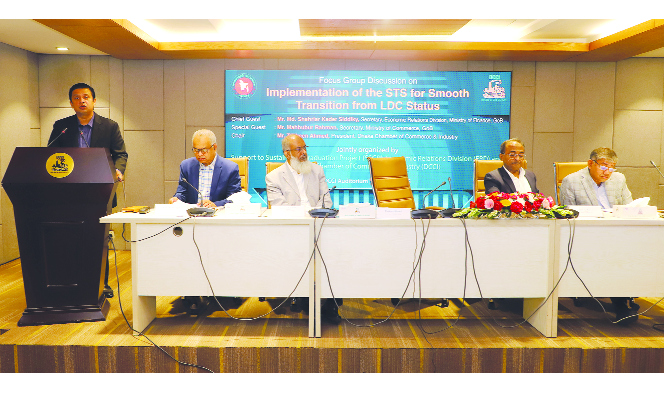

TBT DESK: The Dhaka Chamber of Commerce and Industry (DCCI), in collaboration with the Economic Relations Division (ERD) and the Support to Sustainable Graduation Project (SSGP), organised a focus group discussion on the "Implementation of the Smooth Transition Strategy (STS) for LDC Graduation."
Addressing the event as the keynote speaker, DCCI President Taskin Ahmed highlighted the significant challenges faced by businesses due to global and domestic economic conditions, energy crises in industries, high inflation, excessive import duties, high interest rates, and limited credit flow to the private sector. Given these constraints, he emphasised the need to defer Bangladesh's LDC graduation by at least 2-3 years.
"Bangladesh is officially set to graduate from LDC status on 24 November 2026. However, in light of recent economic instability, energy shortages, and financial constraints, the private sector is under immense pressure. Therefore, we must consider delaying the transition to ensure a sustainable shift," said Ahmed, reads a press release.
He further noted that GDP growth in the first quarter of the current fiscal year stood at 1.8%, with the manufacturing sector growing at only 1.43%. The STS outlines five key objectives, which require effective implementation, strong leadership, partnerships, policy alignment, financial strategies, and continuous monitoring to ensure a successful transition.
Ahmed stressed the importance of enhancing SME capacity, ensuring long-term loans at single-digit interest rates, expanding exports to Middle Eastern and South Asian markets through free trade agreements (FTAs), attracting foreign direct investment (FDI), improving infrastructure, and reforming tax and regulatory policies. He also called for diversifying exports beyond the ready-made garments sector and prioritising pharmaceuticals, leather, agro-processing, semiconductors, light engineering, and ICT.
Chief Guest, ERD Secretary Md Shahriar Kader Siddiqui, stated that Bangladesh must build resilience across all sectors to manage the impact of losing LDC trade benefits. He announced plans to form a committee comprising trade organisation representatives to address private sector concerns. He also noted that rising local production costs are driving inflation, but improvements in the country's balance of payments and financial accounts offer hope.
The ERD Secretary further mentioned that the UNESCAP and the European Union (EU) would provide technical assistance to bridge information gaps and enhance policymaking. Additionally, South Korea has shown interest in supporting Bangladesh's digital transformation.
Special Guest, Commerce Secretary Mahbubur Rahman, acknowledged the lack of early planning for LDC graduation and stressed the need to ensure that the transition remains sustainable, with private sector input shaping policy decisions. He urged businesses to focus on product diversification in the garment industry and strengthen the packaging sector.
In his welcome speech, ERD Additional Secretary and SSGP Project Director AHM Jahangir warned that the private sector would face the greatest challenges post-LDC graduation. He called for a coordinated approach among stakeholders to implement the STS successfully.
SSGP Component Manager Dr Mustafa Abid Khan highlighted that 73% of Bangladesh's exports currently benefit from duty-free access, which will be lost post-graduation. He stressed the urgent need for export diversification and policy reforms to sustain global trade competitiveness.
During the panel discussion, prominent industry leaders voiced their concerns:
Former DCCI President Rizwan Rahman advocated for separating "medium" from CMSMEs (Cottage, Micro, Small, and Medium Enterprises) to ensure fair policy support for smaller businesses. He also called for a comprehensive SME database and stressed that Bangladeshi businesses are not yet ready for LDC graduation.

